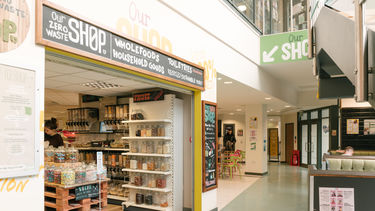Food Waste Action Week is 's flagship annual campaign which brings businesses, government organisations and global partners together to support citizens to develop the tools they need to cut food waste in their homes.
4.7 million tonnes of edible food is thrown away each year by UK households. Shockingly, 25% of this wasted food is as a result of people cooking, preparing or serving too much - this costs UK households £4.9 billion each year.
Food Waste Action Week 2024 will be encouraging citizens to 'Choose What You'll Use', highlighting the benefits of buying loose fruit and vegetables and inspiring people to do this wherever they can. Buying loose items reduces food waste; research has shown that if all apples, bananas and potatoes were sold loose, we could save 60,000 tonnes of food waste by enabling people to buy closer to their needs.
University initiatives and actionsCommunity fridges
The University now has three Community Fridges since the first one was launched in January 2017, with fridges located at the Edge (Endcliffe), the Ridge (Ranmoor) and the Students Union. The fridges allow students, staff and members of the community to donate or pick up food such as loose fruit and veg, sandwiches or baked goods. Surplus food from our outlets is also donated to the fridges.
The University has collected over 150 tonnes of food from local stores which equates to over 2 million meals, and has also achieved carbon footprint savings of over 150,000kg thanks to the community fridges.
Zero waste shop
The ∫˘¬´”∞“µ Students‚Äô Union‚Äôs Zero Waste Shop helps staff and students buy only what they need. It has a variety of food items such as herbs, spices, pasta and rice that consumers can buy in exact amounts as you pay by weight. You can also bring your own containers, helping to reduce single use plastic packaging.
Donate, Don’t Waste
Throughout the year, but particularly at the end of terms, we encourage students to donate unopened food to our food bank donation points as part of our Donate, Don’t Waste scheme. Since 2015, this has resulted in over 12.4t of food being donated to the S6 Foodbank by our students, enough to provide 21,465 meals.
How we handle our food wasteAnaerobic digestion
At the University of ∫˘¬´”∞“µ, we take the necessary steps to make sure our food is handled sustainably and food waste is minimised. Since November, all food waste from our cafes and residences has been collected and taken for anaerobic digestion. This is the microbial breakdown of organic matter in the absence of oxygen. Anaerobic digestion produces biogas which can be used as a source of energy similar to natural gas, the digestate can also be applied directly to the land or composted and used as a soil amendment making it the most sustainable way to deal with food waste.
Sending this waste to be digested has a big impact on reducing the amount of waste we send for energy recovery. For example, our cafes use over 10 tonnes of dry coffee beans every year, which doubles in weight once used.
Our outlets, stock and surplus food
The stock for our University outlets is ordered and delivered based on levels of trade and demand to avoid waste from the get go, deliveries are then organised to redistribute food between outlets. Any surplus food still remaining is donated to the community fridges or given away to the wider community and food banks.
Food that is not wrapped or cannot be given away or sold is collected into food waste containers, which are located at every outlet. It’s this food waste that is then sent for anaerobic digestion.

